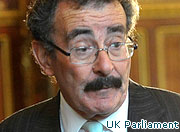Rapid advances in genetic technologies could lead to a form of child “eugenics” and have serious implications for society, a leading fertility expert has warned.
Professor Lord Robert Winston said that current controls will not be able to keep pace, and people could want to modify their children to enhance desirable characteristics.
Last week the fertility watchdog advised the Government to allow the creation of three-parent embryos, amid concerns about future genetically modified children.
Dehumanise
Top scientists and ethicists have warned about the potential to dehumanise and commodify relationships between children and parents.
Professor Winston gave the warning in a lecture at the Roslin Institute in Edinburgh.
Beforehand, he told the Scotsman newspaper that would use the lecture to highlight the dangers of “genetic meddling”.
Modify
He said: “We may find that people will want to modify their children, enhance their intelligence, their strength and their beauty and all the other so-called desirable characteristics.
“That is going to become an increasing risk as a market.
“That will be a form of eugenics which will actually have all sorts of serious implications for developed societies.”
Criticise
Professor Winston also said he would heavily criticise the HFEA (Human Fertilisation and Embryology Authority).
He said: “I am going to argue that the regulatory framework that we have in this country is almost completely pointless”.
He added: “That is something I strongly feel about. I think that the HFEA (Human Fertilisation and Embryology Authority) is not capable of regulating either the commercial aspects of reproductive technologies or the risks that people who undergo these technologies really run.”
Concerned
Bioethics expert Dr Calum MacKellar said Professor Winston is right to be concerned.
He said in a letter to the Scotsman, “eugenics is not just a problem of the past”.
He added: “Eugenic ideology is already with us and it is developing very fast. As a society we have to examine and discuss what is happening as a matter of urgency.”

